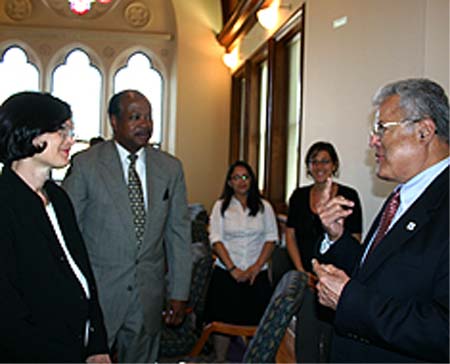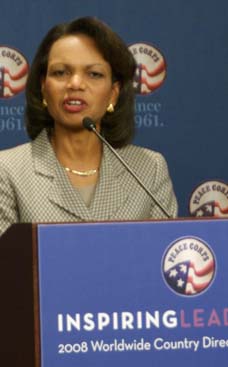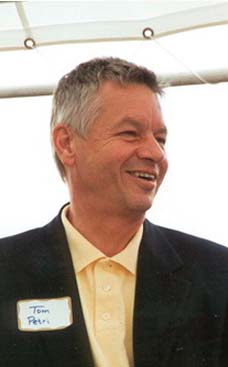
While the RPCVs acknowledged that it would be helpful if the Peace Corps had a unit dedicated to training deaf people, they emphasized that, like anyone—hearing or deaf--the level of support a volunteer needs varies from person to person. For example, Hochgesang said some deaf volunteers may want an interpreter, while some may want to tackle communication issues on their own. Moran pointed to Frances Parsons, a Gallaudet alumna and former professor who served as a Peace Corps professional participant in the mid-1980s and traveled throughout Southeast Asia without an interpreter. “Deaf people are such skilled communicators that within five minutes they are going to get their message across,” said Ross, adding that from her observation, “It’s the hearing (Peace Corps) volunteers who get the most frustrated,” when facing language barriers.
Expanding opportunities for deaf Peace Corps volunteers
Expanding opportunities for deaf Peace Corps volunteers
Caption: Allene Zanger (left), Peace Corps regional director for the inter-American Pacific region, and Henry McKoy, regional director for Africa, chat with President Davila at a recent meeting with Peace Corps volunteers (PCVs) and officials. Also in on the conversation were Norma Moran (background, left), a returned PCV who volunteered in Kenya from 2000 to 2003, and Julie Hochgesang, who served in Kenya from 2002 to 2004.
Since the 1970s, deaf volunteers have assisted people suffering hardship around the world through the Peace Corps, a U.S. federal agency which is in its 47th year of promoting world peace through its American volunteers and development assistance funding.
Over the past 10 years, deaf volunteers have been primarily sent to work as educators in Kenyan schools for deaf students. Although their experiences have been positive, returned Peace Corps volunteers (RPCV) have expressed their desire to open up volunteer positions in all regions of the world and in all areas, such as youth outreach, community development, business development, agriculture and environment, health and HIV/AIDS, and information technology.
To explore this idea, representatives of Gallaudet, Peace Corps, and returned peace corps volunteers (RPCVs) came to campus in May to discuss the possibilities.
The three regional directors representing all Peace Corps programs and three RPCVs were invited to campus by Dr. Amy Wilson, an associate professor in the Department of Educational Foundations and Research, to discuss expanding programs to include deaf volunteers in more countries and in more fields of service.
Present to report first-hand on the potential of deaf Peace Corps volunteers were National Technical Institute for the Deaf and American University alumna Norma Moran, Gallaudet alumna Julie Hochgesang--both of whom served recently in the Peace Corps as deaf educators in Kenya--and Trish Ross, who is hearing and a graduate of Gallaudet’s Department of Education, and is a former Peace Corps volunteer in Nepal and Jamaica and a Peace Corps trainer for Kenya. The RPCVs made the point that deaf people can work in any position in any field with the appropriate support.
By working overseas where attitudes about deafness may be negative, volunteers show that deaf people are capable of being productive, independent, and equal to hearing people in the community. It has been shown time and again that deaf Peace Corps volunteers become role models to other deaf people and motivate and encourage them to take positive steps in their lives. However, the RPCVs made it clear to the Peace Corps representatives that they are interested in having deaf volunteers reaching out to all communities, not only deaf people.
This is an opportune time for the Peace Corps to become more accessible and inclusive of deaf volunteers--their work overseas is supported by the recently ratified United Nations Convention on the Rights of Persons with Disabilities, a human rights treaty aimed at erasing rampant discrimination, segregation, and lack of opportunities for the world’s 650 million people with disabilities—74 million of whom are deaf.
This historic treaty comes at a time when an increasing number of people who are deaf or have disabilities are becoming more mobilized and interested in offering their assistance in developing countries. A case in point is Gallaudet, which offers opportunities to study international development in the Graduate School and is dedicated to integrating social justice and community service with instruction in its new curriculum. For anyone graduating from college who wishes to reach out to those who need development assistance in developing countries, the Peace Corps offers a golden opportunity.
Representing Gallaudet at the meeting, in addition to Wilson, were Dr. Barbara Gerner de Garcia, chair of the Department of Educational Foundations and Research; Dr. Richard Lytle, special assistant to the president and former chair of the Department of Education who has had extensive experience working with Chinese government officials in improving educational opportunities for the country’s deaf population; and Dr. Asiah Mason, director of Regional, National, and International Outreach Programs.
While the RPCVs acknowledged that it would be helpful if the Peace Corps had a unit dedicated to training deaf people, they emphasized that, like anyone—hearing or deaf--the level of support a volunteer needs varies from person to person. For example, Hochgesang said some deaf volunteers may want an interpreter, while some may want to tackle communication issues on their own. Moran pointed to Frances Parsons, a Gallaudet alumna and former professor who served as a Peace Corps professional participant in the mid-1980s and traveled throughout Southeast Asia without an interpreter. “Deaf people are such skilled communicators that within five minutes they are going to get their message across,” said Ross, adding that from her observation, “It’s the hearing (Peace Corps) volunteers who get the most frustrated,” when facing language barriers.
The three agreed that because the Peace Corps already has excellent training and support programs in place for its volunteers in developing countries, the main thing deaf people entering the program will need is access to existing services. “The Peace Corps is a fabulous program,” said Ross. “I think every American should have an opportunity to do it, including deaf people.”
“You’ve raised the issue of giving all people who want to work to be able to,” said Henry McCoy, Peace Corps regional director for Africa, at the conclusion of the meeting. “I believe the answer is yes.” But McCoy said the Peace Corps first must figure out how to provide deaf volunteers all the resources they need, particularly interpreters, even when they are stationed in remote areas.
The regional directors will continue their discussion with Gallaudet and the three RPCVs in the near future, said Wilson.









